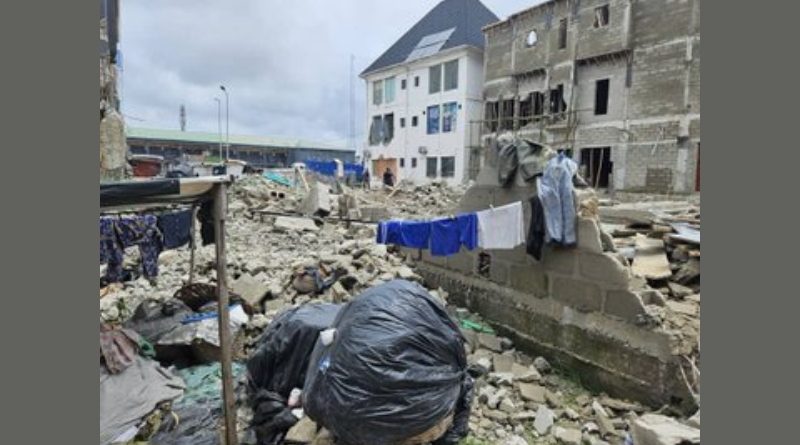Lagos govt defends Trade Fair demolitions, cites Supreme Court judgement
The Lagos State Government has defended the recent demolition of buildings at the Trade Fair Complex in Ojo, saying the action was legal and backed by the Supreme Court’s 2003 judgement.
According to the government, the Supreme Court judgement affirmed the state’s authority over physical planning and development control within its territory, including on federal lands.
The Commissioner for the Environment and Water Resources, Tokunbo Wahab, said in a statement on Tuesday that the complex, though managed by a federal board, remains under Lagos’ jurisdiction for planning and building approvals.
“Trade Fair is not a sovereign community within Lagos State,” Mr Wahab said. “The board, which is a creation of the Federal Government to manage the complex, does not have powers to approve or regulate building developments independent of the Lagos State Government.”
He explained that under the Nigerian Urban and Regional Planning Act (1992)—as domesticated by Lagos State’s Physical Planning and Development Regulations—all physical development in the state requires planning permits from the Ministry of Physical Planning and Urban Development.
Citing the Supreme Court judgement in Attorney-General of Lagos State v. Attorney-General of the Federation (2003), Mr Wahab said the court ruled that land use and physical planning fall under concurrent jurisdiction, allowing states to regulate development within their territories, including on federal lands, except for core areas such as military formations.
“The Trade Fair Complex Board may manage leases and commercial activities, but any construction or alteration still requires a Lagos State planning permit. Otherwise, such developments are illegal under state law,” he added.
His statement followed criticisms from a senator, Victor Umeh, who had earlier described the demolitions as “illegal” and “beyond the jurisdiction of the Lagos State Government.”
Mr Umeh who represents Anambra Central, speaking on Channels Television’s The Morning Brief on Monday, said the complex was federal property managed by the federal government through the Trade Fair Management Board.
“The country is governed by laws and the constitution,” Mr Umeh said. “I’m disappointed that the Lagos commissioner came on air to justify an illegal action. Federal lands are managed by federal agencies, not state governments.”
But responding on X (formerly Twitter), Mr Wahab dismissed the senator’s position as “ignorant,” insisting that the demolitions were lawful and not politically motivated.
“When it comes to Lagos State, every Tom, Dick, and Harry has an opinion. Was it illegal when Gov. Alex Otti removed contraventions in Abia State? Was it also illegal when Gov. Soludo removed contraventions in Anambra? Here in Lagos, every of our actions are backed by law, and we stand by it all,” he wrote.
State rebuffs Obi’s criticism
The Lagos State Government also rejected claims by former presidential candidate Peter Obi that traders at the complex were unfairly treated during the demolitions.
Mr Obi, who visited the site on 30 September alongside Labour Party officials, had described the demolitions as “a test of impunity, justice and compassion,” saying many affected traders had obtained approvals before their structures were pulled down.
“Many of the affected traders invested heavily—often through loans—to secure their livelihoods. A society seeking progress must protect enterprise, encourage productivity, and defend citizens’ dignity,” he said.
However, the Commissioner for Information and Strategy, Gbenga Omotoso, said Mr Obi “misrepresented the facts.”
“Approvals for physical development can only be issued by the Lagos State Government, not the Trade Fair Management Board,” he said.
“The owners of the buildings had no state approval. They were given ample time to regularise their papers during a general amnesty declared last year, which was extended several times, but they refused.”
Mr Omotoso added that ministry officials inspecting the site were attacked and had to be rescued by the police.
Why the state acted
The Commissioner for Physical Planning and Urban Development, Oluyinka Olumide, said the demolitions were based on the 2003 Supreme Court judgment and the Lagos State Urban and Regional Planning and Development Law 2019 (as amended).
“We acted to stop the development of unapproved and unsafe buildings in the complex,” Mr Olumide said.
“Since November 2023, developers were repeatedly urged to regularize their approvals, but many failed to do so.”
According to him, the affected structures were either unapproved, structurally defective, or built on road setbacks and drainage alignments.
The demolitions were carried out on 25 September by the Lagos State Building Control Agency (LASBCA), Physical Planning Permit Authority, and Urban Renewal Agency, with armed security personnel providing cover.
Traders allege lack of notice
Some traders, however, told The Punch that the demolitions came without prior notice.
An eyewitness, identified as Ikenna, said the operation started around 8 a.m. without a court order or notice to vacate.
Another trader, Stephen, claimed that one of the demolished structures had federal clearance.
An engineer on-site, Samuel, said buildings were marked for demolition on the same morning the operation began


